Web3.0辩论:简析关于Web3的四个误导
原文作者:Packy McCormick
原文翻译:Block unicorn
希望这是我们最后一次围绕 web3 进行如此笼统的、无用的辩论。我感谢纽约大学斯特恩商学院Scott Galloway(@profgalloway)教授 列出了所有反对(派) Web3 的观点,这样我们就可以推翻他们并继续前进。
Web3.0辩论
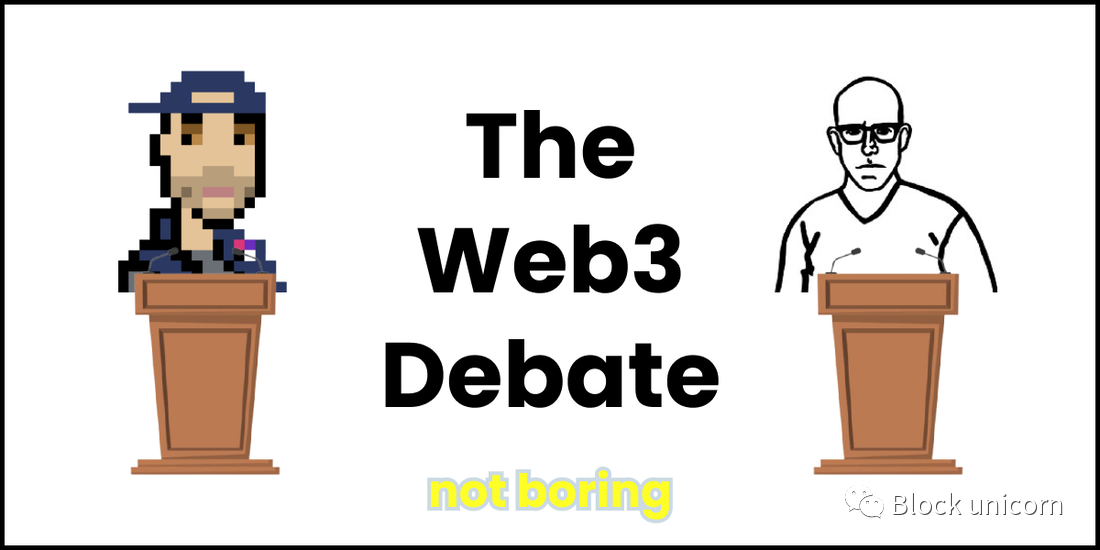
上周五,大家最喜欢的Scott Galloway教授发出了一篇题为《Web3》简单的文章。
我应该对打开这篇文章感到紧张吗?我是长期加密货币持有者,我一点也不紧张,因为我不会站在教授一边,他会写什么样的文章,这正是他写的那篇文章。
现在我不希望这成为 “ 教授的扣篮,因为他总是错的 ”。我的朋友、Party Round的首席执行官 Jordi Hays 宣称 “ 在加洛韦上拉屎已经完蛋了 ”。对我朋友的观点,倾向于同意,我甚至不想回应。
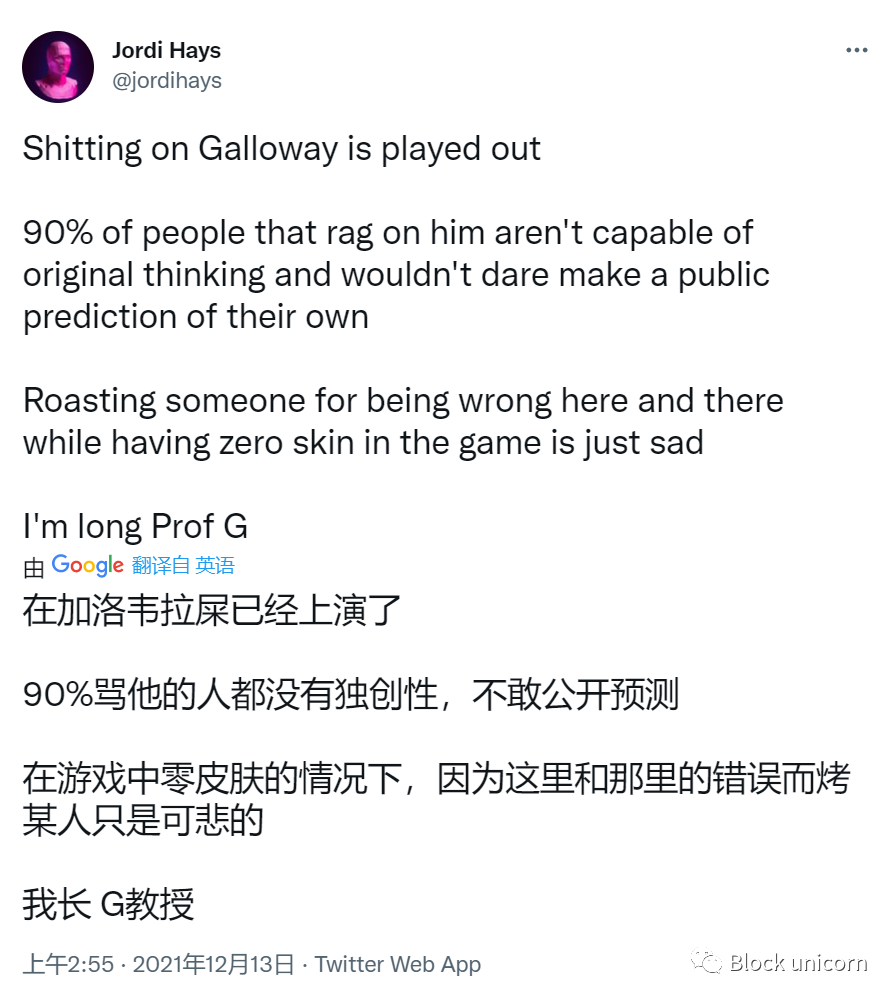
但后来我注意到他错误地引用了我的话,并且歪曲了我所参与的事情。然后我更深入地观察了一下,发现了很多错误和误导。
教授的文章是对其他人的懒惰论点反刍(将半消化的食物继续放回嘴巴里咀嚼),其中有一些关键的不准确之处,无论是有意的还是无意的。成千上万的人阅读、聆听,甚至付费向他学习,通常这不是我的问题……但如果他无论如何都会不小心把我拉入这场辩论,那就让我们辩论吧。
欢迎来到辩论俱乐部
冒着让自己看起来不可思议的风险:我在高中和大学时进行了激烈的辩论,实际上,当 COVID 来袭时,我刚刚在纽约市成立了一个辩论俱乐部。
在议会辩论中,就像我们在辩论俱乐部所做的那样,有两个团队——提案方和反对方——对一项决议进行辩论。该决议可能类似于 “ 通用人工智能应该拥有基本权利 ”。提案方为该决议辩护,而反对方则试图在其中戳漏洞。
双方来回争论不休,最后在每个团队的反驳中总结辩论,重申他们的观点,并试图弄清楚他们一方获胜的原因。
为了赢得辩论,您需要做一些事情, 最明显的是,你要找到最有利于你的证据。
在您的研究过程中,您还会发现与您的观点相矛盾的证据。请注意这些证据,以防您需要对其进行辩护,但无论如何,不要提起它(当然,除非您正在玩高级游戏并且想说 “ 我希望我们的对手会告诉你 x、y、z……他们错了,因为 a、b、c。”)。不那么谨慎的辩论者甚至可能会弯腰或编造事情。
请记住,辩论的重点是赢得胜利,而不是了解真相,那是辩论 101 类型的东西。
然后是更高级的狗屎:不是打你被分配的战斗,你开始一场新的战斗,不管你的议程是什么。
一位经验丰富的辩手会花费大量时间来设置定义,以我们的通用 AI 辩论为例,什么是通用人工智能?
该提案可能将通用 AI 定义为“一种具有与人类相似的智能和情感的存在,除了起源之外,其他一切都与人类没有区别。” 如果反对党让这个定义下滑,他们可能已经输掉了辩论。
他们更有可能会回来说定义是错误的,并且专家们同意,“人工智能是智能代理理解或学习人类可以完成的任何智力任务的假设能力。”
提案可能会回来并因为使用维基百科的定义而召集反对派,重申他们自己的定义,并争辩说他们自己的定义是正确的。
经验丰富的辩论者之间辩论的结果通常归结为谁的定义。 如果通用 AI 与人类无法区分,那么它当然应该具有基本权利(我们甚至不开始定义基本权利!)。
如果通用 AI 只是一种理解或学习智力任务的假设能力,它可能应该拥有比人类更类似于计算机的权利。
真的,如果你赢得了定义之战,那么你得到的实际分数就没有那么重要了。 总而言之——如果你是像我这样的书呆子,辩论是一场非常有趣的智力战,但它不利于发现真相,也不是一种特别有用的方式来处理现实世界的对话。
不幸的是,在过去的几周里,一场辩论正是 web3 对话所变成的。
Web3 对话:辩论多过对话
可能自从中本聪在 2008 年放弃该白皮书的那一天起,就有人支持加密货币,也有人反对它。在那些支持它的人中,交战派系他们选择的代币和链,为至高无上而战。
内斗是愚蠢的,适得其反的,而且永无止境。比特币与以太坊。以太坊与所有其他智能合约 L1。仲裁与乐观。比特币与世界。正如我之前所写,我是一个极简主义者。
前战斗也是不变的,但攻击的角度会发生变化和演变。首先,反对论点是加密货币只是被犯罪分子使用。然后就是对环境不好。当一个批评被充分反驳时,批评者就会转向下一个批评。
今天,争论似乎是 web3——包括传统的“加密货币”以及诸如 dApp、NFT、社交代币和 DeFi 之类的东西——是由 VC 组成的结构,并不像你想象的那样去中心化。 无论是什么原因,人们很少改变立场或改变主意。
我想你可以管理一个与加密无关的性格测试——比如大五人格测试——并高度准确地了解谁在哪一边。你可以通过查看某人最近 50 条关于其他技术或新事物的推文来做同样的事情。如果 1950 年代不喜欢猫王和摇滚乐的人今天还活着,那么他们很可能会反对加密货币。
所以真的,正在发生的事情是人们提前选择了自己的立场,然后尝试使用他们可以使用的任何证据来证明自己的观点,而不是接受证据然后下定决心。
从这个意义上说,web3 更多的是辩论而不是对话。 如果我们将其视为一场议会辩论,那么这一特定辩论的决议将类似于:“ Web3 很好。”
反对党的开幕致辞,前 Twitter 和现任 Block 首席执行官兼比特币极简主义者杰克·多尔西(Jack Dorsey)在 12 月发推文时为这场特别的辩论奠定了基础:
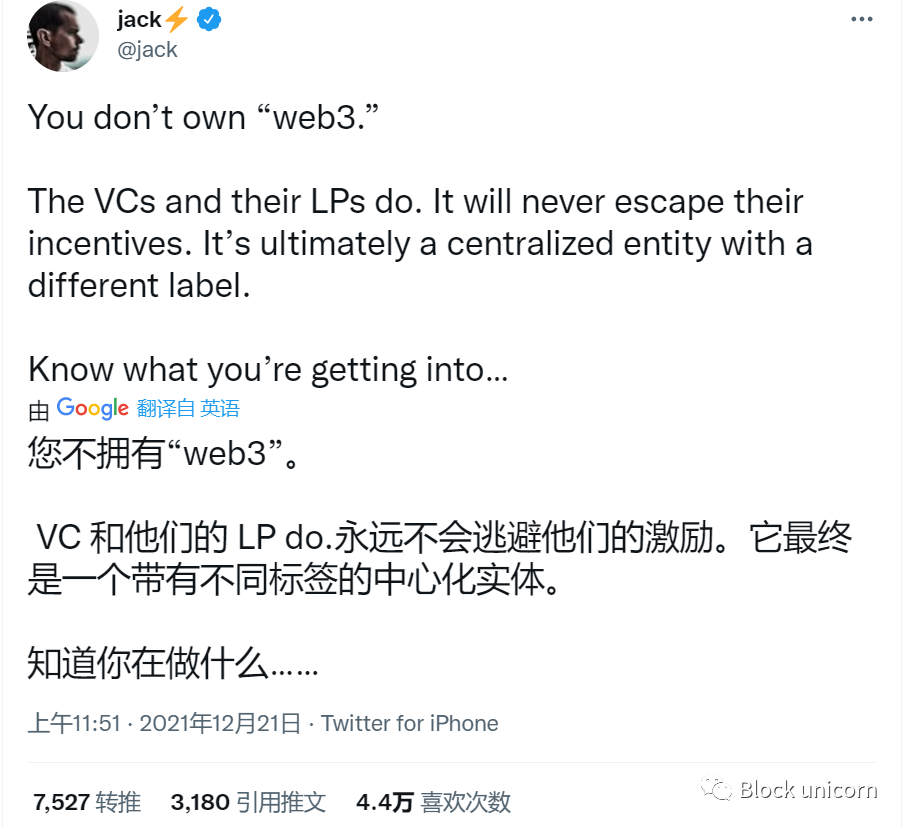
Jack提出了VC 拥有 web3 的想法,因此它被集中到了聚光灯下。
在第二篇文章中,Signal 首席执行官 Moxie Marlinspike 在本月早些时候撰写了他非常深思熟虑的文章:《我对 web3 的第一印象 》时为其添加了一些质感。他对反对党的最大贡献是认为web3 实际上依赖的中心化技术比你的对手想让你相信的要多得多。
既然您已经接受过辩论的精妙训练,您应该能够看到这里发生了什么。杰克和Moxie将战场转移到中心化程度上的辩论。
他们正试图赢得Web3定义之战,他们没有说 “ Web3 很好 ”,而是将焦点集中在更容易获胜的 “ Web3比从外部看起来更中心化,这很糟糕 ”。 就像经验丰富的辩手一样,Moxie和杰克巧妙地转移了战场。
然后 Scott Galloway 教授像酷爱人一样撞穿了墙壁,不请自来,Scott Galloway 教授加入了辩论,并在对反对党的粗鲁反驳中暴露了他的一面诡计。
Scott Galloway教授参加 Web3 辩论
当我在高中辩论时,有时我们会随机分配三人一组。如果你的团队有两个强辩者和一个弱辩者,理想情况下,你会在你的三个演讲过程中变得强、弱、强。开场强的辩手可以定下基调,实力较弱的辩手会在中间稍稍跌跌撞撞,然后另一位实力强的辩手就可以进来收拾烂摊子,用有力的反驳来收拾烂摊子。
但是有时,较弱的辩手会要求进行反驳,而您却不忍心拒绝,所以您让他们最后离开……这是一场火车失事。
反驳是最后的论点。它通常是成败。在反驳中,辩手总结了他或她的球队的观点,再次撕毁对方球队的观点,然后试图在整个事情上打一个令人信服的弓。反驳中不允许有新的信息;这只是对所说内容的总结。您能做的最好的事情就是在现有要点之上使用更加丰富多彩和引人注目的语言,并以使您的团队看起来不错的方式构建所有内容。
它应该相当容易——没有新的观点要提出——但在一个软弱或缺乏经验的辩论者手中,反驳可能是一场灾难。
当这种情况发生时,问题往往是两位更强大的辩论者提出了大部分论点并弄清楚它们如何组合成一个更大的叙述。他们感受到了骨子里的争论,更深层次地摸索着,实际上明白了他们想说什么,但他们需要依靠实力较弱的辩手来传达。
通常,即使较弱的辩手大多提出了正确的观点,但在演讲、单词选择、流程以及他们靠在笔记上并看着他们的搭档的方式中,他们清楚地表明这不是他们的争论,他们实际上并不知道他们在说什么。
这就是阅读教授对 web3 的咆哮的感觉,就拿这一段来说,一个简短而简单的一段,暴露了他的许多诡计:

哇!读到这里,你可能会想,“ 教授太坏了!他知道 web3 基础设施,他必须知道他的东西!我可以相信他所说的一切。”
事实是,这是 Moxie 作品中糟糕的复制粘贴改写工作。虽然他确实链接到了这篇文章(这是“人们不想运行自己的服务器 ”的下划线),但他没有在文章或段落的任何地方提到 Moxie 的名字。
作为一种风格,这可能会被原谅。就个人而言,我会以 “ 正如 Signal 首席执行官 Moxie Marlinspike 所指出的那样…… ” 来领导,以免人们认为我试图将这些想法作为自己的想法传递出去,但那只是我自己。但是其中还隐藏着一些其他的东西,表明教授只是在反刍而不是理解。
首先,该段中唯一的原创想法——人们不想每次购买一条面包时都必须编写代码——是稻草人。当然,如果人们不得不编写代码来购买面包,那当然会很糟糕,但这没关系,因为世界上没有人建议人们需要编写一行代码来购买任何东西。

事情不是这样的,这不是任何工作方式
其次,教授没有指出a16z在 10 月份以 35 亿美元的估值领投 Alchemy 的 C 轮融资,但错过了这次上篮!如果我是他的辩论伙伴,我的耳朵会冒出蒸汽。a16z他抓住了每一个机会的到来,包括对 Coinbase 和 OpenSea 的投资。
无论如何,这只是更大辩论中的一段:
杰克为 web3 的反对派发表了第一次演讲,并试图设定定义,以在 web3 中就 VC 所有权进行辩论,他把事情搞砸了,这是有效的。
Moxie 发表了第二次演讲,处理了 Proposition 的一些主张,并为反对派添加了一个新观点:技术堆栈也比人们意识到的更加集中,也做得很好。
然后,教授站出来对反对党进行反驳,然后……呜呜。
现在,再一次,我认为 web3 辩论有点愚蠢,有好有坏,有好有坏,有些事情应该集中,有些事情应该分散,没有什么是好的或全是坏的(因为一个更细致入微的提议和反对综合,请查看我的朋友 Dror 的文章《Unpacking the Web3 Sausage》,我更喜欢更有建设性的对话。
一切,无处不在,总是关于权衡,Web3 也不例外。我更喜欢从那里开始的更具建设性的对话,辩论是如此……暴力。
但就像我说的,我不喜欢我和我的朋友被误导。 因此,我决定掸掉旧辩论裤的灰尘,加入战斗,以反驳 “ Web3 很好 ” 的命题。
我对 Web3 辩论中的命题的反驳
女士们、先生们、法官、队友,当然还有尊敬的对手:感谢你们今天来到这里参加这场引人入胜的辩论。
因为我们有点偏离了方向,所以我想提醒大家我们正在讨论什么。我将直接阅读论文中的决议,以确保我不会遗漏任何内容:“ Web3 很好。”
现在,反对党已经尽一切努力辩论这场关于中心化与去中心化的定义,如果在任何地方都存在中心化——在上限表、技术堆栈或消费者选择使用的平台上——他们会让你相信,那么 web3 就很糟糕。他们已经表明,有些地方存在中心化。当然有!你不会在这里听到任何争论。
但这并不意味着反对党赢了,因为这不是这场辩论的主题。围绕 web3 或任何网络的特定属性(例如集中化或不良行为者的存在)的争论并不重要,例如争论互联网不好是因为 Facebook 或 4chan(讨论日本的宅文化和流行贴图为主题网站或频道)的存在。
我们公开同意存在不良行为者、诈骗和欺诈行为,并且大量代币存放在少数人的钱包中。我们同意,要为那些想要它的人建立一个真正去中心化的互联网还有很多工作要做,并且强烈同意不是每个人都会这样做。
我们会比我们的对手走得更远,说完全去中心化的未来是不可能的。有些人总是更喜欢中心化的服务,更多的人更喜欢完全去中心化的服务,而另一些则更喜欢中心化的服务。
但这场辩论不是关于中心化与去中心化,这是关于选择的辩论。 这场辩论是关于 web3,一个由用户和建设者拥有的互联网,精心策划的代币,对人类来说是好还是坏,不仅仅是它今天的最早形式,而是它所拥有的承诺。(看看我在那做了什么?)
这是关于如果企业家拥有 web3 工具,世界是否会变得更好。再次,它是关于选择——建设者的选择和用户的选择。
有些人会想要集中式服务,有些人会想要完全去中心化的服务,许多人会选择在不同时间和不同事物之间为他们工作的点。我们认为他们应该有这样的选择。
我们认为 web3 给了他们这样的选择,但我们会到达那里。
首先,请允许我尝试推翻反对派的论点,正如加洛韦教授的反驳所总结的那样。我会告诉你为什么它们是不相关的、不正确的、误导的,或者完全是错误的。重要的是,我会证明,当证据不太合适时,他会歪曲事实以使其合适。
这个谎言网络支撑了教授试图作为论点传递的内容,如果您无法遵循它,我理解,我会试着总结一下,它是这样的:
精英们正在利用“去中心化的承诺”来集中控制并获得难以想象的财富。中心化在 NFT 和比特币所有权、福布斯十二 (12) 位加密亿万富翁名单、Coinbase 和 OpenSea 等潜在垄断企业以及基础设施本身中显而易见。有犯罪,DAO 没有那么集中,因为宪法 DAO 不是,因为它们选举代表,当我们拥有上市公司时,为什么我们需要新的互联网原生结构?此外,由于韦伯太空望远镜的存在,中心化非常好,NFT 和 DAO 等 web3 工具具有潜力,但潜力不大,监管机构需要阻止创新者。此外,a16z 还投资了中心化公司。认识新老板,他是你的老老板。另外,Elon 站在我这边,Gary Gensler 最好做点什么。反正,不希望 web3 受到监管。Web3 和 Web2.0 是一回事,Facebook 和 Google 控制的太多了,问问十几岁的女孩,这人是否很好?
我在这里有点夸张,但不是真的。回去读他的文章,这就是为了流量,它可能不是瑜伽babble,但它是 babble 的东西。
但是一个不连贯的论点应该引起同情,而不是愤怒。 四个具体的误导让我热血沸腾。其中两个是我个人参与的,第三个是我公开反驳的一部分,第四个只是简单的数字。你会看到,没有这些,教授的论点就更没有意义了。
误导#1
辩论经常是一场定义之战,所以当教授使用我对 web3 定义的版本修改(并称之为 “yogababble”)时,我的耳朵振作起来(大笑)。

Yogababble(精神主义的美德信号)是教授最喜欢的词之一。他实际上在文章的后面重复了这一点,认为权力下放是 “ 为欺诈创造了一个科切拉音乐节,匿名、精神主义的美德信号和复杂性保护欺诈者免受监督或问责。” 我没有被这个人物冒犯,我认为我的定义无论如何都不是完美的。
我有点生气的是,教授调整了我的话以符合他的核心论点——web3 实际上并不像看起来那样去中心化。具体来说,他在中心化定义中添加了去中心化这个词。
我在他链接的文章中使用的实际定义是:“Web3 是建设者和用户拥有的互联网,由代币编排。” 我故意没有使用去中心化这个词,因为我不认为去中心化实际上是关键特征,但它确实是一个很好的稻草人,所以教授把它扔在那里。
为了慈善起见,这是一个微妙的区别,他引用的文章中讨论了去中心化。
但最终,这不是适用我的定义。他试图重新构建我所说的以适应他的论点。他被抓住了,您可以放弃该尝试。
误导#2
第二个误导是直数, 加洛韦使用下面的图表表明,“ 宣传的权力从少数人手中分散,实际上是权力重新集中到少数人手中。”
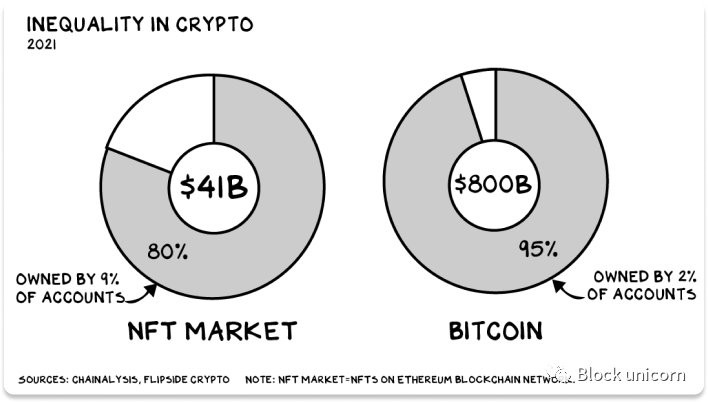
右边的图表代表BitInfo的数据,显示 2% 的账户拥有 95% 的比特币,这意味着,“ 如果是一个国家,比特币将拥有世界上最大的不平等。”
(当然,在教授的论点中,他没有提到他的前敌人现在的盟友杰克和他的公司 Block 是世界上最大的比特币持有者之一,并且占那 2%。)
不过,Glassnode(加密货币数据平台)去年 2 月发现了该分析中的一个大漏洞。2% 包括 Coinbase 等交易所的钱包,其钱包为数百万人保存比特币。对此进行调整后,前 2% 的人拥有 71.5% 的比特币。Glassnode 的那篇文章并不晦涩;这是当你用谷歌搜索 “ 比特币集中度 ” 时出现的第四件事。
我们同意 71.5% 仍然是高浓度;不像 95% 那样耸人听闻,但它的好处是准确,在某种程度上对我们的对手很重要。我们同意,我们希望看到所有权更平均地分配。但我们不同意这与教授的论点有关,特别是因为对于教授的队友来说,Jack、web3 和比特币是非常不同的。
这是另一件小事,但我希望你能接受教授的模式,无视任何不利于他的案件的证据。
误导#3
接下来,教授认为 DAO 通常不是去中心化的,他使用了我参与的宪法DAO 的例子,具体来说,他写道:
因在4300万美元的美国宪法原件竞购战中败诉而成为新闻的ConstitutionDAO在关闭之前甚至没有建立治理模型,因为创始人没有想出如何防止一些大持有者或 “ 鲸鱼 ” 控制权。
他将核心团队成员Jonah Erlich与 The Verge 的Nilay Patel的对话联系起来。事实证明,这并不是乔纳(Jonah)所说的。我将在这里给出完整的对话部分,向您展示教授是如何挑选和选择的:
边缘:当有人购买名为 $PEOPLE 或 $WTP 的代币时,他们每个代币获得一票吗?
Jonah:我们还没有弄清楚治理模型,在急于能够购买这份文件的过程中,有很多细节我们要在我们获胜后弄清楚。如果我们赢了,我们实际上是在讨论不同的治理模式。最大的担忧之一是,加密世界中的一些大持有者——我们称之为鲸鱼——将对宪法副本发生的事情拥有过大的控制权。我们的重要信息是:这是一场为人民而战的运动。这是人民的宪法副本,所以我们希望它由人民控制。
我们正在研究不同的机制。我们正在研究直接民主投票:一个象征,一票。我们还在查看每个钱包一票,这不是一个人的确切代表,但它非常接近。二次投票是另一种机制,当一个人拥有更多代币时,投票权实际上会减少:你不会为每一百个额外的代币增加一百张额外的选票,而是随着代币数量的增加而减少的选票数量。
Verge:当你说 DAO 正在快速运行组织结构的历史时,你是在描述快速运行民主的历史:建立一个投票系统并弄清楚这些投票将如何代表一群人。但是,必须由一群人做出这些决定,不完全民主,这对ConstitutionDAO有什么作用?
Jonah:有一个很好的概念叫做渐进式去中心化:真正开始完全去中心化的东西真的很难,所以你必须从一个最初的团队开始构建一些东西,然后再把它带到去中心化。我们与ConstitutionDAO 的计划是,一旦我们赢得这次拍卖,我们将尽可能快地实现最大程度的完全去中心化。
只有在最不仁慈的解释中,您才能将上述内容解读为 “ 没有建立治理模型,因为他们无法弄清楚如何阻止鲸鱼接管。”
事实上,Jonah 在回答 Patel 的问题时提到了鲸鱼,即人们是否每个代币都会获得一票,而不是作为没有治理模型的原因。事实与教授的观点相反;创始人确切地知道如何阻止鲸鱼接管:不要给每个代币投一票。
正如Jonah 所说,真实的故事是:
从构思到拍卖不到一周。
团队选择处理非关键任务的事情,比如在获胜的情况下的治理模型,直到我们真正获胜。
潜在的治理选项是已知的(乔纳列出了一些);那不是瓶颈。
一直以来,99.9% 的 DAO 的计划都是逐步去中心化,这是公认的最佳实践。
那不是我依靠记忆和第一手经验,这正是Jonah在教授引用的对话中所说的,教授只是选择省略任何不符合他观点的内容。
一个为期 6 天的项目还没有去中心化是对整个 DAO 概念的软弱和业余控诉。事实上,教授反对 DAO 的论点似乎更广泛地基于一个非常基本且不准确的治理模型,其中最大程度的去中心化是目标,每个决定都应该是一个人一票。这并不能反映当场的现实。
误导#4
最后,我的反对者认为,权力下放的叙述 “ 是一个由大祭司传福音的假神,他们通过火星大小的资金盘,并告诫监管这是异端。” 语言有趣多彩;这一点是不正确的。
除了少数比特币极端主义者(无论如何都倾向于讨厌 web3)之外,在 web3 或加密货币或任何你想称呼它的任何东西中,没有一个严肃的人不相信它应该受到监管,更不用说谁相信这种规定是异端。我曾就这个话题与之交谈过的每一位创始人和投资者都希望美国的监管早日到来,这样他们就可以停止建立模糊性投资,转变为明确性的投资。
事实上,当我和 a16z 的 Chris Dixon在《经济学人》中写到加密货币的未来时,我们以呼吁对美国及其他地区的行业进行明智的监管来结束这篇文章:
未来一年,美国和其他民主国家的更多领导人将意识到需要合理的监管,鼓励负责任创新,同时允许企业家建立下一代互联网。
a16z,我是一名顾问,教授决定用自己的部分单独列出,在其网站上有一个部分专门用于 web3 政策,其中指出:
我们对 web3 在恢复对机构的信任和扩大获得机会方面的潜力持完全乐观的态度。但实现这种潜力取决于明智的政策。良好的监管为创新如何在管理可能损害消费者的实际风险的同时造福社会建立了一个框架。是时候定义这个愿景了。
没有人告诫监管是异端,恰恰相反,我建议教授看看该公司对政策制定者的建议,或仔细阅读其美国政策议程、全球政策议程或DAO的法律框架。

a16z
这些都是事实,但事实可能会妨碍教授的好故事,正如@Jack 所说:“言出必行,让真相大白于天下”。
当然,还有更多的例子表明缺乏理解,或者缺乏理解的欲望。他提到了 a16z 对中心化交易所 Coinbase 的投资,但没有提到它对去中心化交易所 Uniswap 的投资。
他指出数据显示,最近推出的区块链代币在股票发行时拥有更多的内部人所有权,但并未承认这些项目中的大多数都是在加密货币的熊市成立bi并得到资助的,需要风险投资才能生存。
毫无疑问,他从 Moxie 那里得到了启发,他还使用 OpenSea 作为 web3 集中化的一个例子,他在不了解事实的情况下夸大了自己的手:
建立垄断力量、拥有渠道(即集中化)的潜力越来越多地成为 VC 的资金来源,这就是 web3 的真正协议。世界上最大的 NFT 市场 OpenSea 与任何其他交易平台都非常相似:作为使交易更容易和(适度)更安全的回报,该公司从每笔交易中抽取2.5%的分成。
具有讽刺意味的是,在教授发表文章前四天,一个名为LooksRare的 NFT 平台启动了。NFT 平台一直在推出,这一点特别重要的是它如何引导初始需求。
LooksRare 向用户空投了其总 $LOOKS 代币供应的 12%,这主要取决于用户在 2021 年 6 月至 2021 年 12 月期间在 OpenSea 上的交易量。这些数据对他们来说很容易访问;这一切都在以太坊区块链上公开可用。
LooksRare 能够通过向在 OpenSea 上花费最多的人提供最大的奖励来吸引 OpenSea 的最大客户。他们还能够诱使这些客户在 LooksRare 上执行特定活动以解锁这些代币:直到我在平台上列出要出售的 NFT 之前,我无法领取我的 200 美元 LOOKS。实际上,我甚至从未在 OpenSea 上列出过 NFT,但我现在已经在 LooksRare 上列出了一个!
那么它有效吗?是的,根据@hildobby 的这个沙丘(Dune Analytics)仪表板: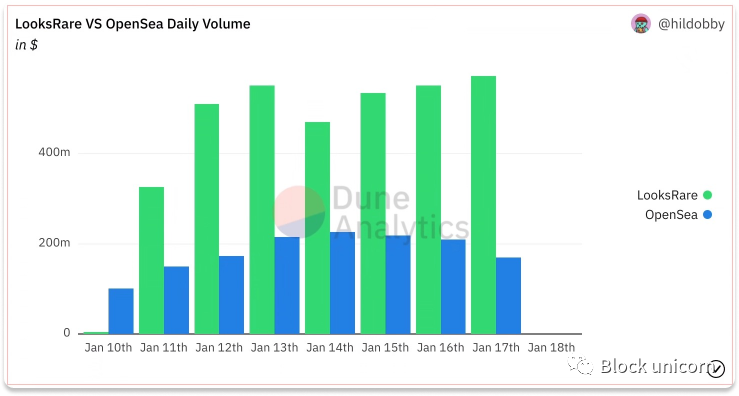
现在还为时过早,关于 $LOOKS 的讨论很多,但这是一个好的开始。LooksRare 的每日交易量是 OpenSea 的 2-3 倍,尽管 OpenSea 在每日用户和每日交易量方面仍在被LooksRare吸取。正如一些人所指出的那样,这里有一些刷量交易和流动性挖矿,这是造成差异的原因,这是良好开端的一周,并且显示出一种攻击角度,可以用去中心化服务来击败中心化服务。
现在,LooksRare 需要在早期势头的基础上再接再厉,留住并扩大其用户群。为此,它构建了平台以降低 gas 费用,奖励购买和出售 NFT 的用户,收取较低的交易费用, $LOOKS 代币持有者可以分享 100% 的费用。
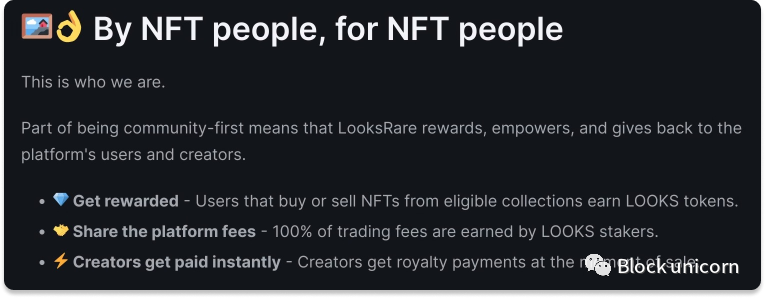
很难看到这一点并称 OpenSea 为垄断企业。当然,如果你正在寻找,如果你试图找到真相而不是试图赢得辩论。
事实上,这正是杰克、莫西(Moxie),当然还有教授错过的重点,这与任何特定平台是否是中心化的或谁拥有多少无关。这是因为数据是开放的,建设者和用户有选择权,他们会选择提取更少并给予他们更多所有权的平台。
在 web3 中,如果一个平台误导了用户,这些用户可以选择将他们的数据和资金转移到另一个平台。
它还强调了为什么整个辩论实际上毫无意义。在我们交流的过程中,一些企业家打开了他们的笔记本电脑,构建了更好的东西,并且比我以往任何时候都更好地为 web3 提供了理由。
我希望我们现在可以结束这场愚蠢的辩论,并像 Moxie 的文章那样进行更细致、更深思熟虑的对话,而不是像教授那样大声而不准确的大喊大叫,或者只是让开。
Web3 并不全是好或全是坏,但我们相信它是 “ 好 ”。无论哪种方式都在发生,它应该得到更深思熟虑和诚实的批评,是的,监管需要充分发挥其潜力。



